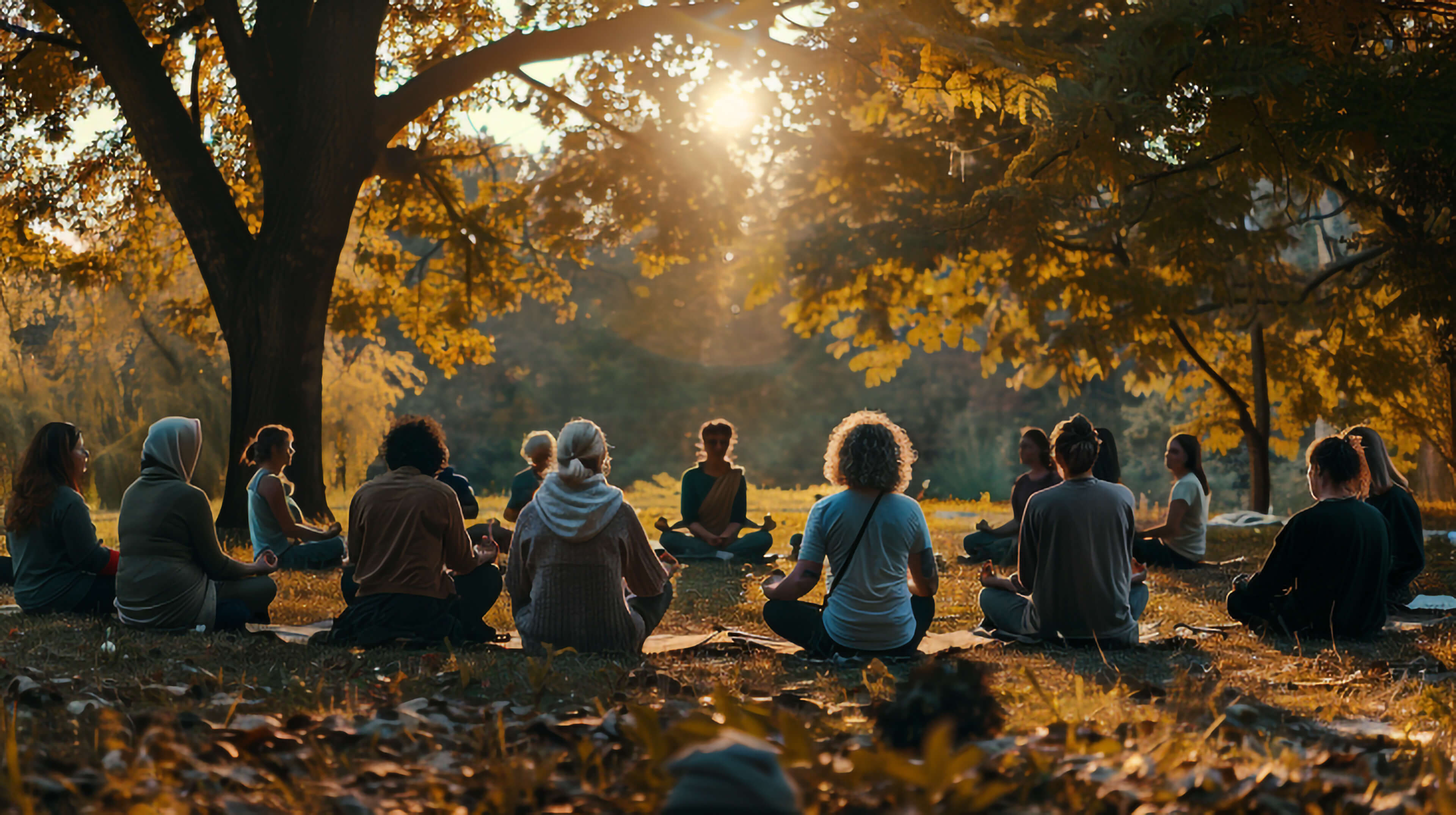Introduction
Have you ever felt lost in the relentless pace of today’s world, yearning for a moment of tranquility amidst the chaos? Imagine if this peace were not just a fleeting escape but a profound integration of your mental wellness and spiritual enlightenment. Such a harmony is not only possible but increasingly necessary in our fast-paced, often disconnected society.
This article explores how the fusion of spiritual enlightenment with mental health practices can offer a more holistic approach to living. At a time when mental health issues loom large and spiritual pursuits are often relegated to the periphery, integrating these realms promises a richer, more balanced way to navigate life’s complexities.
As we delve into this exploration, we’ll uncover techniques that blend traditional psychological health practices with spiritual principles, explore the benefits of this integration, and share insights from a community that values both psychological robustness and spiritual depth. This journey is not just about combating mental health struggles; it’s about enhancing life’s quality by embracing a broader perspective that includes spiritual growth.
Join us as we pave a path to inner peace, learning how to nourish both mind and spirit in a holistic way that respects and enhances our inherent need for connectedness and harmony. This is your invitation to transform the way you view mental health and spiritual enlightenment—two vital aspects of life that, when integrated, can lead to profound personal transformation and a deeper sense of peace.
Understanding Enlightenment and Mental Health

Enlightenment has long been a beacon in the pursuit of knowledge and inner peace. In the spiritual context, it represents a state of profound insight and understanding that transcends ordinary human experience, often associated with the awakening experiences described in various religious traditions around the world. Intellectually, enlightenment denotes the age of reason in Europe—a time characterized by intellectual rigor, questioning of traditional doctrines, and the valuing of empirical science. Both contexts, though arising from very different origins, emphasize the liberation from ignorance and the pursuit of knowledge.
Historically, the quest for enlightenment has influenced countless cultures and philosophical schools, shaping the ways in which societies understand the nature of reality and human existence. From Eastern philosophies like Buddhism, which advocates for the cessation of suffering through meditative practices and moral living, to Western movements such as the Enlightenment period, which stressed reason and scientific method, these perspectives have contributed significantly to both personal growth and societal development.
The Connection Between Mind, Body, and Spirit
In modern mental health, a holistic approach is increasingly recognized as essential for well-being. This view considers not only the biological aspects of health but also the psychological and spiritual components. The interdependence of mind, body, and spirit suggests that none of these elements operates in isolation; rather, they are components of a complex system that must be balanced for overall health.
Dr. Andrew Newberg, a neuroscientist known for his research on the neurological basis of religious and spiritual experiences, has stated, “Our spiritual health profoundly impacts our physical health, and vice versa. Meditation, prayer, and spiritual practices have shown in numerous studies to reduce stress and to enhance immune function.” Similarly, psychological theories such as Maslow’s hierarchy of needs place self-actualization and transcendence at the highest levels of human fulfillment, indicating a deep-seated need for spiritual experiences in achieving personal wellness.
This interconnectedness is further supported by both anecdotal and scientific evidence that suggests a direct relationship between spiritual practices like meditation and measurable changes in brain regions associated with stress, empathy, and resilience. Thus, the fusion of mental health practices with spiritual enlightenment is not just beneficial but essential for a comprehensive approach to health.
Understanding these foundational concepts of enlightenment and mental health is crucial as we embark on a journey toward a holistic path to inner peace. As you, the reader, delve deeper into these realms, consider how integrating these aspects of your life might lead to greater harmony and fulfillment. Reflect on your own experiences and how they might inform your approach to blending these critical elements of existence. This understanding serves as the cornerstone upon which we will explore practical techniques, unearth the benefits, and engage with community insights in the succeeding sections of this article.
This exploration is not merely academic; it is a practical guide that lights the way toward a more enlightened, healthy state of being. Let us continue this journey together, embracing the complexity and richness that comes from integrating the spiritual with the mental, the mystical with the empirical, as we seek a path that leads to both personal and collective peace.
The Science Behind Serenity
Benefits of Integrating Enlightenment with Mental Health

Emotional and Psychological Benefits
The journey toward integrating spiritual practices like meditation, mindfulness, and prayer with mental health strategies opens a gateway to profound emotional and psychological benefits. Research continually supports the notion that these spiritual practices contribute to significantly lower stress levels. A study published in the Journal of Psychiatric Research found that participants engaging in daily meditation showed decreased anxiety levels and enhanced mood states compared to those who did not meditate.
Moreover, these practices do more than just alleviate symptoms of stress and anxiety; they contribute to long-term psychological stability. Regular engagement in spiritual activities fosters a deeper sense of peace and well-being, enhancing emotional intelligence. This enhanced capacity for emotional regulation allows individuals to experience and express their emotions in a healthier way, promoting greater overall mental resilience.
Spiritual Growth Impacts
The path to personal enlightenment—understanding and integrating spiritual insights—can lead to transformative breakthroughs in mental health. Achieving a state of enlightenment often results in a profound shift in perspective that directly impacts one’s approach to mental health challenges. This transformative power is evident in the increased self-awareness and self-regulation that individuals experience.
For instance, the practice of mindful reflection, a component of many spiritual paths, enables individuals to recognize their thought patterns and emotional reactions without judgment. This awareness is crucial in psychological therapies that aim to modify problematic thinking patterns and behaviors. As a result, individuals not only cope more effectively with stress but also enhance their life satisfaction by aligning more closely with their core values and beliefs.
Case Studies and Real-Life Examples
Mahatma Gandhi
Mahatma Gandhi, a name synonymous with non-violence and the Indian independence movement, extensively used meditation and reflection as cornerstones of his mental and emotional strategy. Throughout the tumultuous period of struggle against British rule, Gandhi adhered to a routine of daily meditation, which he believed deepened his commitment to his principles of truth and non-violence. This spiritual discipline not only fortified his emotional resilience but also enhanced his mental clarity, enabling him to make strategic decisions under immense pressure. Gandhi’s psychological approach to conflicts and his method of peaceful resistance were profoundly influenced by his spiritual practices, demonstrating how deeply intertwined his mental wellness was with his spiritual life.
Dalai Lama
The Dalai Lama, the exiled spiritual leader of Tibet, is renowned for his teachings and practices centered around meditation and mindfulness. Despite facing ongoing political and existential challenges, including the plight of living away from his homeland under constant threat, he maintains a demeanor that is both serene and joyful. This mental state is largely attributed to his disciplined spiritual practice, which includes daily meditation sessions that he describes as essential for emotional health. The Dalai Lama’s ability to remain composed and optimistic is a testament to the profound impact that spiritual practices can have on one’s mental health, even in the most adverse conditions.
Mother Teresa
Mother Teresa, celebrated for her charitable work and the Nobel Peace Prize laureate, drew immense psychological strength and stability from her deep faith and daily spiritual rituals. Her service to the destitute and dying in Calcutta was emotionally and physically demanding, yet she managed these challenges with what many described as a surprising amount of joy and emotional resilience. Mother Teresa often spoke of the spiritual joy that underpinned her duties, a joy that emanated from her profound connection to her faith. Her example illustrates how spiritual practices can provide not only a buffer against psychological overwhelm but also a source of deep and sustaining joy amidst severe adversity.
These examples of Mahatma Gandhi, the Dalai Lama, and Mother Teresa illustrate the powerful role that spiritual practices can play in building psychological resilience and maintaining mental health. Each story reveals how integrating spiritual beliefs and practices into daily life helped these figures manage significant life challenges. As we reflect on their lives, it becomes clear that the benefits of such integration are not confined to religious figures but are accessible to anyone. By adopting similar practices, individuals may find enhanced mental health and greater emotional stability, illustrating the universal potential of spiritual practices to improve well-being.
As illustrated by the research and real-life examples discussed, the benefits of integrating spiritual practices with mental health strategies are both significant and manifold. This synergy not only helps in managing mental health conditions but also enhances personal growth and emotional resilience. By understanding and applying these insights, you, the reader, can embark on a more balanced, fulfilling journey towards overcoming life’s mental pressures and achieving inner peace. This holistic approach is not merely beneficial—it is essential for anyone seeking to lead a more integrated, peaceful life.
Practical Techniques for Integration

1. Mindfulness and Meditation:
Step-by-Step Guide to Mindfulness Exercises
- Finding Your Space: Choose a quiet, comfortable spot where you won’t be disturbed. This can be anywhere from a corner of your bedroom to a secluded part of a local park.
- Setting a Time Limit: Start with just five minutes a day. As you grow more accustomed to the practice, gradually increase the duration.
- Getting into Position: Sit in a comfortable position, either on a chair with your feet flat on the floor or on a cushion on the floor with your legs crossed. Keep your back straight but relaxed.
- Focusing Your Breath: Close your eyes and bring your attention to your breathing. Notice the sensation of air entering and leaving your nostrils, or the rise and fall of your chest.
- Returning Your Focus: Your mind will wander. This is normal. Each time it does, gently bring your focus back to your breathing without judgment.
Maintaining Consistency and Deepening Practice: Establish a regular schedule to practice mindfulness. Use reminders or apps if helpful. As you progress, explore different meditation techniques such as guided imagery or loving-kindness meditation to deepen your experience.
Benefits to Mental Health: Regular mindfulness practice can significantly enhance your focus, decrease stress levels, and improve your emotional reactivity. Studies have shown that it can also reduce symptoms of anxiety and depression, leading to a more balanced mental state.
2. Cognitive Spiritual Therapy:
Integrating Cognitive-Behavioral Techniques with Spiritual Beliefs
Cognitive Spiritual Therapy (CST) is an innovative therapeutic approach that combines the evidence-based strategies of Cognitive Behavioral Therapy (CBT) with spiritual beliefs, providing a more holistic treatment paradigm. CST helps individuals reconcile their spiritual and psychological selves, addressing cognitive dissonance and promoting a more harmonious inner life.
Examples of CST in Practice:
- Aligning Beliefs and Behaviors: A patient might explore how their spiritual beliefs about compassion can help manage negative thoughts about others, using CBT techniques to replace critical or judgmental thoughts with more compassionate responses.
- Enhancing Personal Meaning: In therapy sessions, individuals might discuss how spiritual rituals or scriptures can inform their personal values and actions, thus providing a deeper sense of purpose and direction.
3. Daily Routines and Rituals:
Incorporating Spiritual Practices into Daily Life
- Morning Meditations: Start each day with a short meditation or prayer session to set a tone of calm and intention for the day.
- Reflective Journaling: Keep a journal to reflect on daily experiences in the context of your spiritual beliefs. This can help in recognizing and reinforcing how everyday events align with your spiritual values.
- Evening Gratitude Practices: End your day by listing things you are grateful for. This can shift focus from daily stresses to a more positive outlook, enhancing overall mental well-being.
- Consistency and Mindfulness: The key to making these practices impactful is consistency. Make these routines a fixed part of your day, akin to eating or sleeping. Mindfulness in performing these acts ensures that they remain meaningful and not just another task.
As you integrate these mindfulness exercises, cognitive spiritual therapies, and daily rituals into your life, remember that the path to inner peace is personal and progressive. Experiment with these techniques, adapt them to suit your unique needs, and be patient with your progress. The journey towards a balanced integration of mental health and spiritual enlightenment is ongoing, but each step brings you closer to a more fulfilled and peaceful existence.
Challenges and Considerations

Common Pitfalls and How to Avoid Them
Integrating spiritual practices with mental health strategies can be enriching, yet it’s not without its challenges. One common misunderstanding is the belief that spiritual practices can completely replace traditional mental health treatments, especially in cases of severe psychological disorders. This misapplication can lead to inadequate treatment and worsening conditions. It is essential to recognize that while spiritual practices like meditation, prayer, or mindfulness can significantly enhance mental health, they should complement, not replace, conventional medical advice and treatments.
To avoid these pitfalls, it is advisable to:
- Consult with Professionals: Always involve mental health professionals when you are looking to integrate spiritual practices into your treatment plans. This collaboration ensures that all aspects of your health are considered.
- Educate Yourself: Understand the limits and benefits of each practice. Being well-informed can prevent misapplications and unrealistic expectations.
- Seek Balanced Approaches: Ensure that spiritual practices are used as part of a broader, more comprehensive health plan. Balance is key to effective integration.
Overcoming Resistance and Skepticism
When introducing spiritual practices into your mental health regime, you may encounter skepticism, both from within yourself and from those around you. Internal skepticism can stem from doubts about the effectiveness of these practices, while external skepticism often arises from family, friends, or even healthcare providers who may view such approaches with caution.
To manage and overcome these challenges:
- Open Communication: Engage in discussions with skeptics. Sharing personal experiences and scientific research that highlight the benefits of integrating spiritual and mental health practices can help in gaining their support.
- Introduce Gradually: For those new to the concept, introduce spiritual practices gradually. Invite them to sessions, workshops, or talks that explain the psychological benefits of these practices.
- Joint Sessions: Consider attending sessions with therapists who specialize in integrative practices together with skeptical family members or friends, allowing them to hear from experts firsthand.
Navigating the challenges of integrating spiritual practices with mental health strategies requires patience, openness, and persistence. Recognize that these challenges are part of the journey towards a holistic approach to well-being. By facing these hurdles with informed decisions and a balanced perspective, you enhance your ability to achieve inner peace and mental resilience. This section is not just a guide but a companion in your journey, ensuring you feel supported and understood as you explore the complexities of harmonizing spiritual and mental health practices. Engage with these challenges as opportunities for growth and deeper understanding, leading to a more fulfilling path towards personal enlightenment and mental wellness.
Finding Community and Support

Navigating the path of integrating spiritual practices with mental health is a deeply personal journey, yet one that does not have to be walked alone. Engaging with communities and groups that share similar interests can provide essential support, fresh insights, and meaningful connections.
Online Communities and Forums
The internet is a treasure trove of resources for those looking to blend spirituality with mental health care. Here are some platforms where individuals can engage in meaningful discussions and receive support:
- Org: Focuses on mindfulness and its application within mental health. This forum offers resources, shared experiences, and expert advice, providing a supportive environment for beginners and seasoned practitioners alike.
- The Daily Meditation Forum: A vibrant community discussing various forms of meditation techniques and their benefits for mental health. Members range from meditation experts to those just starting their practice, making it a rich resource for learning and exchange.
- Integrative Mental Health Professionals Group on LinkedIn: This professional network includes therapists, counselors, and psychologists who incorporate spiritual practices into their therapies. It’s an excellent place for finding expert advice and discussing more formal integrations of these disciplines.
Tips for Engaging Effectively:
- Introduce yourself and your interests when joining a new platform to receive a more personalized experience.
- Actively participate in discussions to gain more insights and also share your own experiences.
- Respect differing opinions to foster a supportive and open environment.
- Local Workshops and Groups
Finding local groups or workshops can provide an opportunity to experience community support and shared learning firsthand. Here’s how to locate these valuable resources:
- Community Centers and Spiritual Organizations: Many community centers and spiritual groups host workshops that blend spiritual practices with mental health strategies. Check their bulletin boards or websites for upcoming events.
- Wellness Clinics and Holistic Health Centers: These centers often offer workshops on meditation, yoga, and other spiritual practices with a focus on mental well-being.
What to Look for in a Workshop or Group:
- Ensure that the event or group’s philosophy aligns with your personal beliefs and mental health needs.
- Look for sessions that emphasize respect, confidentiality, and a non-judgmental atmosphere.
Reaching out and becoming part of a community can significantly enhance your journey towards integrating enlightenment and mental health. Whether online or in person, these communities offer a space to learn, share, and grow together. Remember, the collective wisdom and support of a community can provide motivation and inspiration that is hard to find when you go it alone. Engage actively and openly, and you may find that this journey enriches not only your mental health but also your overall sense of connection and well-being.
Visions of Tranquility: Artistic Expressions of Inner Peace
Conclusion

As we conclude our exploration of “Integrating Enlightenment and Mental Health: A Holistic Path to Inner Peace,” let us reflect on the key insights shared throughout this journey. We began by defining enlightenment in both spiritual and intellectual contexts, underscoring its profound relevance to modern mental health challenges. Understanding this historical and philosophical backdrop sets the stage for a deeper integration of mental wellness and spiritual growth.
The benefits of such an integration are clear and multifaceted, encompassing emotional resilience, psychological well-being, and an enriched sense of life’s purpose. We delved into practical techniques that anyone can incorporate into their daily lives—mindfulness exercises, cognitive spiritual therapy, and the establishment of nourishing daily rituals. These practices are not only transformative on an individual level but also foster a greater connection to the world around us.
We also addressed potential challenges, from common misunderstandings to resistance from within and from others. Overcoming these obstacles is part of the journey, and finding community support plays a critical role in this process. Communities, whether online or local, provide invaluable spaces for sharing experiences and offering encouragement.
Now, it’s your turn to take the first step on this transformative path. Begin with simple mindfulness exercises each morning to ground your day or join an online forum such as Mindfulnet.org to connect with others on a similar path. For those seeking deeper engagement, local workshops and spiritual retreats can provide hands-on experiences and direct mentorship. Resources like “The Mindful Way Workbook” by Teasdale, Williams, and Segal or the website integrativementalhealth.org can offer guidance and further reading.
In the words of philosopher Pierre Teilhard de Chardin,
“We are not human beings having a spiritual experience. We are spiritual beings having a human experience.”
Remember, the path to inner peace is a journey, not a destination, and each step you take enriches not only your own life but also the lives of those around you. As you embark on this path, keep your mind open, your heart ready for change, and your spirit eager for the deep, fulfilling integration of enlightenment and mental health.









